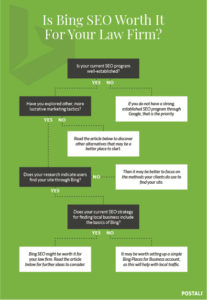Digital Marketing, SEO

SEO stands for search engine optimization, the practice of gaining higher rankings for your website within the non-paid search engine results. However, most consider SEO to be primarily about Google search engine optimization. You’re searching Google to see if your law firm appears on page 1. When your agency sends you reporting, it’s often about your rankings and website traffic from Google. Google is now a verb, and the search giant has monopolized the search engine market.
But is Google really the only search engine you should care about? Is there merit in putting more thought behind your law firm’s rankings on other search engines like Bing?
The truth is – you need to view Bing and other search engines as you would any business opportunity. Is it worth the investment and time? In order to help you make the best decision, consider the following information about Bing.
Facts about Bing
Market Share
In the United States, Google commands 88% of the market share for search engines. Bing comes second with just over 6% of the market. While this shouldn’t necessarily mean that Bing isn’t worth optimizing, it does help to manage expectations. The traffic potential from Google, while it’s extremely competitive, is very high. On the other hand, focusing on Bing SEO simply will not be able to drive nearly as much traffic to your website. It may be less competitive and you could achieve rankings with more ease.
Demographics
SEO is all about identifying your law firm’s target client and serving them relevant information where they’re searching for it. Research shows that Bing users are commonly between the ages of 55 and 64. They’re generally classified as more blue collar and less tech-savvy.
Depending on the type of law you practice and where your firm is located, the demographics of Bing users may be an appealing audience to consider. For example, personal injury attorneys specializing in protection from elder abuse in rural areas may be more likely to see success with Bing SEO than a criminal attorney in a metro area focusing on DUI defense. If the Bing demographics align with your law firm’s client base, it’s a more appealing option to consider.
Bing’s Algorithm
Each search engine has its own algorithm that determines rankings. However, most of them strive to reward websites that create relevant, unique content and provide a great user experience. Thus, many of the things you do to optimize for Google will inherently boost your presence in Bing as well.
For example, Bing values factors like content, mobile-friendliness, links, and on-page SEO factors. These are efforts you should already be engaging in to optimize your website for Google organic search results.

So, is Bing worth it?
Whether or not Bing SEO should be a priority depends largely on your firm’s overall marketing strategy. As with all forms of marketing, what works for the law firm down the street may not necessarily work for you.
You may want to consider a thorough strategy for optimizing your firm’s website on Bing if the following are true:
1. You have a mature SEO program.
If you have spent several years creating a strong presence in Google, you may have the extra bandwidth to focus on other search engines like Bing or Yahoo.
2. You have tested other digital marketing tactics.
It’s not that Bing isn’t important. But it’s probably the case that there are opportunities you can take advantage of that will bring you more cases than focusing on Bing SEO – such as paid social media ads for pay-per-click advertising. If you have established programs for other digital marketing tactics for your law firm, focusing on Bing SEO may make sense.
3. You have data that supports it.
The best marketing decisions are rooted in compelling supporting data. You should have an understanding of where your law firm’s SEO traffic is coming from, and in most cases the majority will come from Google. But that doesn’t mean you should ignore the others. Perhaps you have a smaller traffic volume from Bing, but your reporting shows that it’s steadily growing and the quality of traffic seems to be better.
Maybe there are defining characteristics about how Bing users interact with your website that can support putting resources behind it. For example, if Bing users consistently convert into cases at a higher rate than Google users, you may want to put more effort into Bing.
Be careful with how you’re analyzing your data. Google will always have more traffic and therefore, a lower conversion rate than other search engines, so you shouldn’t shift all of your resources. If you dive into the weeds of your SEO reporting, you should be able to get a better sense of whether or not your firm would benefit from a more concerted effort to optimize for rankings in Bing.
4. Local SEO is important
You may not need to put exhaustive efforts toward optimizing for Bing, but you should consider incorporating Bing into your local SEO strategy. For most law firms, local listings should drive significant traffic to your website and generate new cases for your firm. You should set up a Bing Places for Business account and complete your business profile.
___________
You may want to place Bing on the backburner if:
1. Your law firm is new to SEO.
Attorney websites that are in their first year or two of SEO strategy shouldn’t worry much about Bing or other search engines. The opportunity with Google is simply too vast to justify it.
2. You have a tight budget and need to maximize new cases.
If your budget is tight, you need to ensure you’re spending it on the marketing tactics that will drive the most revenue for your law firm. If you had similar rankings across all search engines, the overwhelming majority of new business would still be generated from Google search. If you need to bring more cases to your firm within a limited budget, you should stick with the tactics that are tried-and-true and place Bing SEO on the backburner.
Evaluate Your Opportunities Across All Search Engines
Most SEOs will tell you not to worry about Bing. The truth is – this is an oversimplification, and there are cases where your law firm may benefit from focusing your optimization efforts across different search engines. However, it’s important to evaluate the opportunity and make decisions that will help your firm grow business in a cost-efficient manner. If you’d like to discuss how your firm should prioritize your marketing efforts, we’re here to help. Contact our experienced law firm marketing agency to learn more today.




